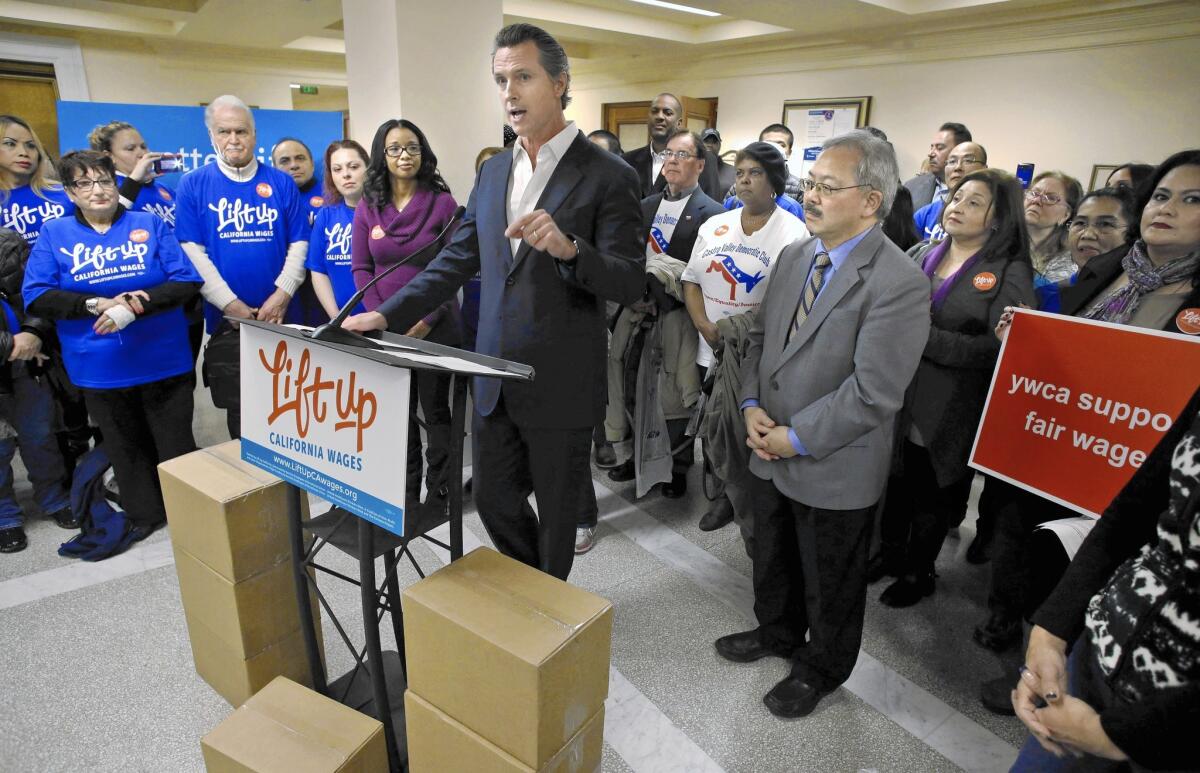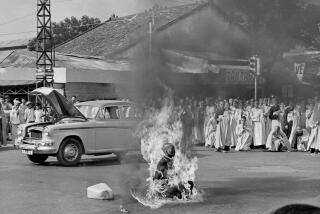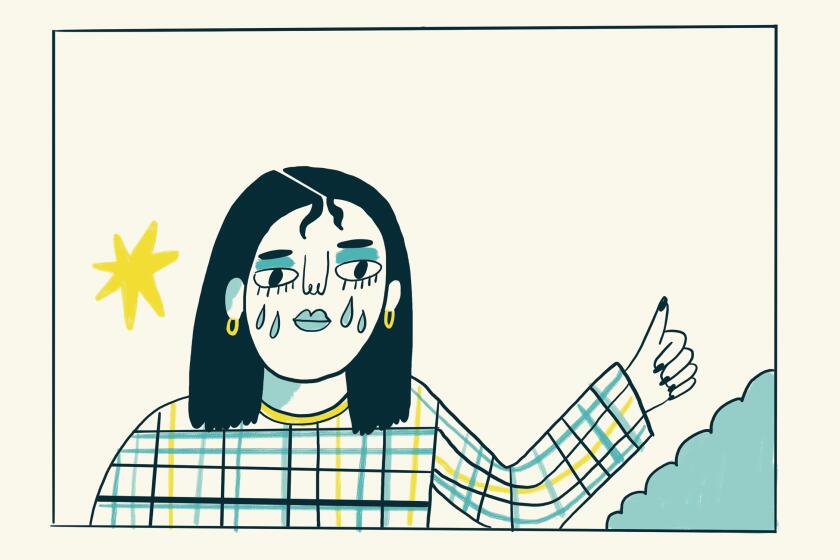Op-Ed: A minimum wage hike is the wrong fix

California Lieutenant Governor Gavin Newsom and San Francisco Mayor Ed Lee address supporters of a ballot initiative asking voters to raise California’s minimum wage to $15 per hour, on Jan. 19.
Here in California we have a patchwork of minimum wages. The state’s $10-per-hour rate is already much higher than the national $7.25 rate, but a number of cities have pushed up the baseline even more — such as San Francisco and Los Angeles, where the minimum wage is set to rise to $15 in the next few years. In November, California voters will have a chance to even things out by voting on the Fair Wage Act, which would establish a statewide minimum of $15 by 2021.
Although there’s something enticing, on the surface, about having the state catch up to its most politically progressive cities, the Fair Wage Act is likely to have negative consequences for many working-class Californians.
Certain parts of the state would feel the effects of the Fair Wage Act more than others, because certain areas have more low-wage workers than others. (Raising the minimum wage will not boost the compensation of a banker earning millions each year, for instance.)
Calculations based on data from the American Community Survey indicate that when fully implemented, in 2021, the Fair Wage Act would affect about 22% of workers in the state’s highest-wage counties, such as San Francisco and Santa Clara, and roughly 38% of workers in Los Angeles. In low-wage areas, it would affect a much larger share of workers — nearly 50% in Fresno and Merced.
“Great news!” the Fight for $15 advocates would argue. “This means the Fair Wage Act will do even more to help workers in the most economically distressed areas.” But this perspective focuses only on the potential benefits of a higher minimum wage, while denying any costs.
Standard economic theory holds that when the costs of low-wage workers are raised by a higher minimum wage, employers reduce employment — for two reasons. First, employers suddenly find it economical to replace, say, two minimum-wage workers with one slightly more expensive, presumably more experienced or efficient worker. (One $25-an-hour worker may be a better deal than two $15-an-hour workers.) Second, the rising cost of salaries leads employers to raise prices, which leads to lower demand, meaning they have to lower overhead by reducing head count.
Raising the statewide minimum wage to $15 would also do more to help businesses and workers in high-wage than in low-wage areas.
A great deal of evidence confirms economic theory. Indeed, many recent studies have found that higher minimum wages in the United States have reduced employment among low-skilled workers. Some economists contest this conclusion — most notably Michael Reich of UC Berkeley, who argues that a $15 minimum could actually increase employment. But the research is simply at odds with the oft-repeated assertion from the likes of economist and New York Times columnist Paul Krugman that “there’s just no evidence that raising the minimum wage costs jobs.”
In areas where the $10 state minimum wage now prevails, the Fair Wage Act would raise the minimum wage by 50% over five years — and, according to standard estimates, reduce employment among the least skilled by 5% to 10%. But those standard estimates are probably low, because they’re derived from research based on much smaller wage hikes. Since a 50% jump would touch so many workers, employers might find it difficult to make the sorts of adjustments that could mitigate layoffs — such as cutting health insurance benefits.
Perhaps more important, some evidence suggests that short-term job loss from a higher minimum wage prevents low-skilled workers from getting a foothold in the labor market, and thus keeps them from acquiring the experience that leads to higher wages in the future. A very high minimum wage may therefore condemn some low-skilled workers to prolonged dependency on government benefits. Maybe it is better to have fewer workers employed at higher wages, and more people without jobs reliant on public support. But I’ve never heard advocates for a $15 minimum wage make that argument.
Raising the statewide minimum wage to $15 would also do more to help businesses and workers in high-wage than in low-wage areas. Business owners in cities that have already enacted $15 minimum wages, for instance, should welcome the Fair Wage Act, because it would reduce their cost disadvantage relative to other areas. Workers in these cities should welcome it too, because the act would reduce employers’ incentive to move to or expand in lower-wage parts of the state. I don’t hear advocates for the Fair Wage Act making these arguments either.
Higher-minimum-wage activists want to capitalize on their recent political successes in progressive cities by pushing a high compensation baseline across the state. That’s rash. A $15 minimum wage may not make sense anywhere. But it surely makes a lot less sense in Fresno than in San Francisco. Wouldn’t it be better to let economists study local minimum wage experiments before expanding them?
David Neumark is chancellor’s professor of economics at UC Irvine and director of the Economic Self-Sufficiency Policy Research Institute.
Follow the Opinion section on Twitter @latimesopinion and Facebook
More to Read
A cure for the common opinion
Get thought-provoking perspectives with our weekly newsletter.
You may occasionally receive promotional content from the Los Angeles Times.






